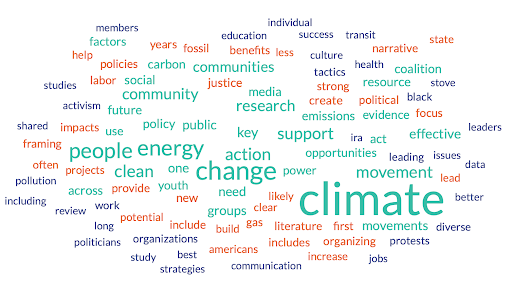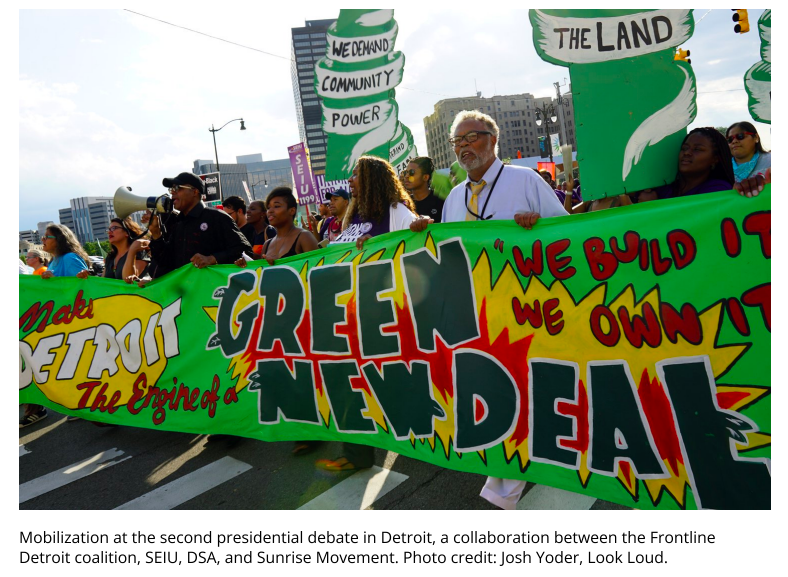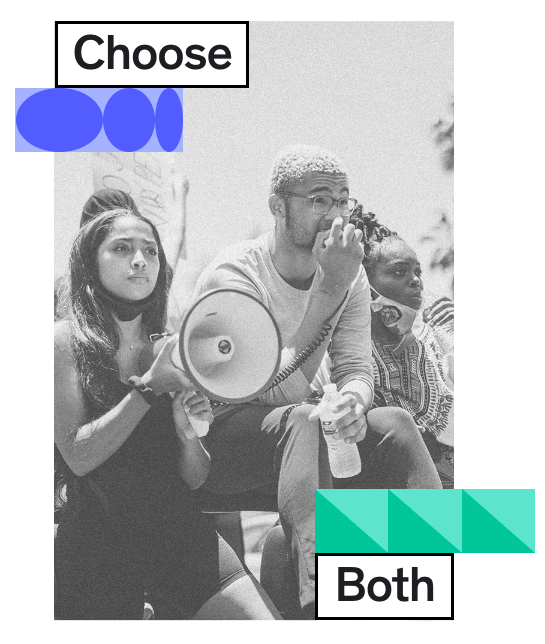Resources
Search below for resources covering the intersection of climate engagement, social science and data analytics.
RESULTS
Notable research of 2023

Inflation Reduction Act
Replenishing trust: Civil society’s guide to reversing the trust deficit
Trust-building is actions aligned to values — it’s not just communicating about what matters, but doing it. Trust for institutions across society is declining. This growing trust deficit is a serious problem: It erodes a high-functioning pluralistic democracy, compromises public health and makes it impossible to solve collective problems like climate change. Trust doesn’t just happen. American civil society institutions have an important role to play in increasing trust — which is necessary to create the kind of world we all want to live in.
Blueprint for a Multiracial, Cross-Class Climate Movement: The Report on Coalitions
Multiracial, cross-class (MRXC) coalition-building is essential if the climate movement is serious about tackling the climate crisis at the scale it demands. However, a historical lack of collaboration, trust, or healthy mechanisms to deal with conflict often impair those efforts. This Blueprint report and accompanying workbook provide an analysis of the difficulties MRXC climate coalitions are likely to face and offer recommendations for a proposed path forward.
Blueprint for a Multiracial, Cross-Class Climate Movement: The Workbook for Coalitions
This workbook is meant to help you translate the analysis and recommendations we provide there into workable features of your organizing. Whether you’re currently involved in a multiracial, cross-class climate coalition, thinking about starting one, or evaluating a past coalition on reflection, we hope this workbook clarifies for you and your coalition partners the breadth of considerations and decisions you should be prepared for.
The emerging picture of the most-often cited challenges grassroots groups are facing currently includes: 1) Help with building intersectional narratives and coalitions to link struggles together; 2) Activist safety & security in repressive environments; 3) Maintaining activist engagement and working together efficiently in groups; 4) How to secure funding for grassroots organizing and how to report impact; 5) How to build effective strategy within non-hierarchical structures; 6) Managing burnout among activist communities & collective care. The Global Grassroots Support Network is a collection of 84 seasoned grassroots organizers, campaigners, coaches and more. The Network supports struggles for climate justice, reproductive justice, LGBTQIAS+ rights, housing justice and workers’ rights. These members currently come from: Australia, Canada, Denmark, France, Germany, Ireland, Kenya, the Netherlands, New Zealand, Nigeria, Spain, Tanzania, Turkey, Uganda, the U.S., UK and Zimbabwe. If you’re excited by the mission of supporting grassroots justice-oriented activists, the Network has lots of room for new members and you can commit the amount of time that is accessible to you, and the input that supports your mission.
The Kernel: A Tool for Developing Good Strategy (and Avoiding Bad Strategy)
The Sunrise Movement successfully relied on the “strategy kernel for campaigning.” The kernel involves three elements: a diagnosis that defines or explains the nature of the challenge, a guiding policy for dealing with the challenge, and a set of coherent actions that are designed to carry out the guiding policy. The Sunrise Movement used the kernel by convening the leadership team for a meeting to discuss each layer of the kernel; usually, a small team then took responsibility for completing the kernel, providing overarching direction for our shared work. In strategy work for movements, this resource’s author has been part of many conversations that began instead with deliberating the third layer of the kernel—the actions the group should take—and ended up spiraling into disagreement. The #ChangeTheDebate campaign in the spring and summer of 2019 is an example of how Sunrise used the kernel: Diagnosis—a central challenge is that the Green New Deal (GND) is polarized and presidential candidates are not talking about it because of the strategic narrative attacks from Fox/right-wing media; Guiding Policy—the movement must force presidential candidates to publicly and boldly talk about the GND in the media; Coherent Actions—launch the campaign will compelling visuals, host debate watch parties across the movement, catalyze a centralized mass action, birddog Biden and other candidates, and run a targeted, escalated action demanding time during the debate devoted to climate.
Nuts and Bolts for Building Resilient Organizations
These are the skills that leaders need to develop in order to build resilient organizations. Humility: A culture of humility lowers everyone’s blood pressure, providing the key foundation for people to be able to work through their differences together. Self-discipline: Self-discipline builds power at scale. Imposed discipline occasionally has its place (firings, etc.), but anything held together only through imposed discipline will be a lot smaller, more fragile, and less powerful than an adaptable, decentralized organization with self-disciplined leaders. To create self-disciplined leaders, we emphasize the skills of simplicity, habits, and joy. Love: It’s valuing people for who they are, seeing the best in them, and figuring out how to integrate people together into mutually beneficial relationships.
Choose Both
Choose Both is a collection of movement builders, supporters, and mobilizers helping partners realize a more open, just, and habitable world. They believe that pursuing equity for marginalized folks is the only way to get there. They work with storytellers, campaigners, designers, and more transforming the way that organizations and initiatives take on racial equity as an impact priority. Choose Both identified 5 key decision-points where these partners can choose both equity and evidence to strengthen their impact. First, choose goals that both capture new visions and meet existing needs. Second, choose storytelling that’s both emotional and technical. Third, choose to reach both loyal audiences and new communities. Fourth, choose to both consider data and challenge bias. Fifth, choose reporting that both inspires your own community and accounts for others.
Charging Toward Justice: How States Can Lead on Racial and Economic Equity through the National Electric Vehicle Infrastructure (NEVI) Program
Deeper community engagement is important as states complete build-out of the initial electric vehicle charger deployment along highways. To do outreach to communities, employ a wide range of outreach strategies to disadvantaged communities, including social media, email lists, local media, and campaigns targeted specifically to communities of color (Black, Brown and Indigenous communities); hold a mix of virtual and in-person meetings, including within disadvantaged communities, to achieve broad geographic and demographic representation; consult with community-based organizations, especially those that represent disadvantaged communities, throughout the NEVI planning process; actively solicit feedback from disadvantaged communities through virtual and in-person meetings, listening sessions, public surveys, and recommendations from community-based organizations; and engage tribal nations, who were often entirely omitted from state NEVI planning but should directly benefit from the program.
Greenhouse Gas Reduction Fund: Best Practices for Equity And Governance
Environmental justice communities can be meaningfully centered and empowered within the Greenhouse Gas Reduction Fund program. Prioritize direct benefits to low-income and disadvantaged communities. Community engagement should be incorporated throughout awardees’ operations, including in their overall governance structure and business plan. Create accountability to local and impacted communities, especially low-income and disadvantaged communities. Operate with transparency, which is a prerequisite for accountability, and helps to build trust with communities and other stakeholders.
Pagination
- Page 1
- Next page







